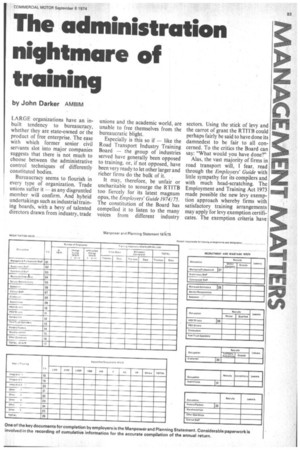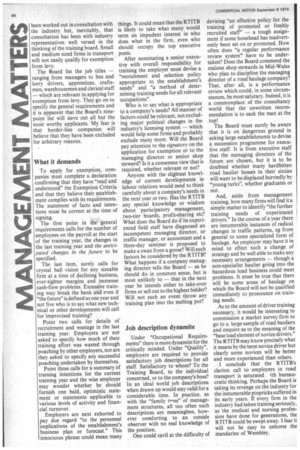The administration nightmare of training
Page 91

Page 92

If you've noticed an error in this article please click here to report it so we can fix it.
by John Darker AMBIM LARGE organizations have an inbuilt tendency to bureaucracy, whether they are state-owned or the product of free enterprise. The ease with which former senior civil servants slot into major companies suggests that there is not much to choose between the administrative control techniques of differently constituted bodies.
Bureaucracy seems to flourish in every type of organization. Trade unions suffer it — as any disgruntled member will confirm. And hybrid undertakings such as industrial training boards, with a bevy of talented directors drawn from industry, trade unions and the academic world, are unable to free themselves from the bureaucratic blight.
Especially is this so if — like the Road Transport Industry Training Board — the group of industries served have generally been opposed to training, or, if not opposed, have been very ready to let other larger and richer firms do the bulk of it.
It may, therefore, be unfair or uncharitable to scourge the RTITB too fiercely for its latest magnum opus, the Employers' Guide 1974175. The constitution of the Board has compelled it to listen to the many voices from different industry sectors. Using the stick of levy and the carrot of grant the RTITB could perhaps fairly be said to have done its damnedest to be fair to all concerned. To the critics the Board can say: "What would you have done?"
Alas, the vast majority of firms in road transport will, I fear, read through the Employers' Guide with little sympathy for its compilers and with much head-scratching. The Employment and Training Act 1973 made possible the new levy exemption approach whereby firms with satisfactory training arrangements may apply for levy exemption certificates. The exemption criteria have been worked out in consultation with the industry but, inevitably, that consultation has been with industry representatives well versed in the thinking of the training board. Small and medium sized firms in transport will not easily qualify for exemption from levy.
The Board list the job titles — ranging from managers to bus and lorry drivers, apprentices, craftsmen, warehousemen and clerical staff — which are relevant in applying for exemption from levy. They go on to specify the general requirements and it is apparent that the Board's ninepoint list will sieve out all but the most worthy applicants. My fear is that border-line companies will believe that they have been excluded for arbitrary reasons.
What it demands
To apply for exemption, companies must complete a declaration confirming that they have "read and understood" the Exemption Criteria and that they believe their establishment complies with its requirements. The statement of facts and intentions must be correct at the time of signing.
The first point in the general requirements calls for the number of employees on the payroll at the start of the training year, the changes in the last training year and the anticipated changes in the ,future to be specified.
The last item, surely calls for crystal ball vision for any sizeable firm at a time of declining business, ever-tighter margins and immense cash-flow problems. Excessive training may break the bank and even if "the future" is defined as one year and not five who is to say what new technical or other developments will call for 'improvised training?
Point two calls for details of recruitment and wastage in the last training year. Employers are not asked to specify how much of their training effort was wasted through poaching by other employers, nor are they asked to specify any successful poaching undertaken by themselves.
Point three calls for a summary Of training intentions for the current training year and the wise employer may wonder whether he should furnish one bald, optimistic statement or statements applicable to various levels of activity and financial turnover.
Employers are next exhorted to pay due regard "to the personnel implications of the establishment's business plan or forecast." This innocuous phrase could mean many things. It could mean that the RTITB is likely to take what many would term an impudent interest in who does what in the firm, even who should occupy the top executive posts.
After nominating a senior executive with overall responsibility for training the employer must devise a "recruitment and selection policy appropriate to the establishment's needs" and "a method of determining training needs for all relevant occupations". Who is to say what is appropriate to a company's needs? All manner of factors could be relevant, not excluding major political changes in the industry's licensing system — which would help some firms and probably exclude many more. Will the Board pay attention to the signatory on the application for exemption or to the managing director or senior shop steward? Is it a consensus view that is required, whether relevant or not? Anyone with the slightest knowledge of current developments in labour relations would need to think carefully about a company's needs in the next year or two. Has the RTITB any special knowledge or wisdom about participatory management, two-tier boards, profit-sharing etc? What does the Board do if its experienced field staff have diagnosed an incompetent managing director, or traffic manager, or accountant and a three-day seminar is proposed to make a swan from a goose? Will such factors be considered by the RTITB? What happens if a company managing director tells the Board — as he should do in common sense, but is most unlikely to — that in the next year he intends either to take-over firms or sell out to the highest bidder? Will not such an event throw any training plan into the melting pot?
Job description dynamite
Under "Occupational Requirements" there is more dynamite for the critically minded. Under "Quality", employers are required to provide satisfactory job descriptions for all staff. Satisfactory to whom? To the Training Board, to the individual concerned, or to the company's boss? In an ideal world job descriptions when drawn up would stay valid for a considerable time. In practice, as with the "family tvtes" of management structures, all too often such descriptions are meaningless, however comforting to an outside observer with no real knowledge of the position.
One could cavil at the difficulty of devising "an effective policy for the training of promoted or freshly recruited staff' — a tough assignment if some bonehead has inadvertently been set on or promoted. How often does "a regular performance review system" have to be undertaken? Does the Board commend the zealous shop stewards in Mid-Wales who plan to discipline the managing director of a road haulage company? That, after all, is a performance review which could, in some circumstances, he most salutary. Indeed, it is a commonplace of the consultancy world that the unwritten recommendation is to sack the man at the top!
The Board must surely be aware that it is on dangerous ground in asking large establishments to devise a succession programme for executive staff. It is from executive staff that the managing directors of the future are chosen, but it is to be doubted whether many hardbitten road haulier bosses in their sixties will want to be displaced hurriedly by "young turks", whether graduates or not.
And, aside from management training, how many firms will find it a simple matter to identify "the further training needs of experienced drivers." In the course of a year there are innumerable instances of radical changes in traffic patterns, eg from general to some specialized form of haulage. An employer may have it in mind to effect such a change of strategy and be well able to make any necessary arrangements — though a non-specialist haulier going into the hazardous load business could meet problems. It must be true that there will be some areas of haulage on which the Board will not be qualified immediately to pronounce on training needs.
As to the amount of driver training necessary, it would be interesting to commission a market survey firm to go to a large sample of road hauliers and enquire as to the meaning of the "base load element of novice drivers." The RTITB may know precisely what it means by the term novice driver but clearly some novices will be better and more experienced than others.
I conclude that the RTITB's clarion call to employers in road transport is saturated ith bureaucratic thinking. Perhaps the Board is taking its revenge on the industry for the innumerable pinpricks suffered in its early years. If every firm in the industry had taken training seriously, as the medical and nursing profession have done for generations, the RTITB could be swept away. I fear it will not be easy to unhorse the mandarins of Wembley.


























































































































































